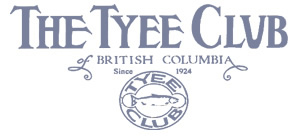REST Committee
REST Committee
Mid Season Report – 2025 REST 2025 mid season memo
REST Committee report – 2025
The Rules, Etiquette, Safety and Tackle Committee, is unique in that it does not embrace change, but rather resists it, upholding the traditional and ethical values of The Tyee Club of British Columbia. Over the past decade the committee has needed to debate and amend Tyee Club rules to deal with technological change. Underwater cameras, GPS, smart phones with depth finding Navionics, lures with scent and rattling devices and extremely bright halogen headlamps are just some of the devices that have tried to make their way into Tyee Club angling. All this modern technology is developed to give anglers a decisive advantage over the fish while taking away the art of skillful angling. In 1949 a 70.5 lb tyee was disqualified because the anglers rod was 1/2 inch too short. Without rules, regulations, and traditions that are above and beyond the minimum DFO standards, and anglers strict adherence to them, we would have only a very ordinary fishing club which never would have lasted over a century.
Morally and ethically, the committee has had to deal with proposals such as recognizing undersize fish with awards and lowering the qualifying weight of a Registered Tyee. To allow any of the above would be a dishonour to anglers who came before us, diluting their achievements while rewarding quantity over quality. This puts the Tyee Club reputation and its existence at risk.
Traditional Angling for large salmon in the river-mouth of a historic river must not be taken for granted. In 1924 the people instrumental in forming the club knew how special and rare this fishery was. They formed The Tyee Club of British Columbia and put rules in place that would see 101 seasons of anglers fishing an experience not attainable anywhere else in the world. As Club Members, we must guard the challenge, not dilute it, and resist change that promotes the catching of fish above all else.
Van Gorman Egan says it best in the book Tyee which he authored in 1988.
“Members of the Tyee Club need always be aware that they hold in trust the standards of an old and honourable sporting institution, which must not be compromised cavalierly. To do so not diminish its reason for existence but deprives the sport of a symbol of higher criteria, of a higher aim. Angling is swamped with gadgets that promise more fish and, in their use, remove the angler more from the process. This is a dilution of the standards, and the sport is poorer without some bearer to resist it. The Tyee Club is that standard bearer. Its resistance to change is a shield to the purity of the sport.”
When fishing for the elusive tyee, safety and etiquette are very important. Minimizing wake from your boat when passing other boats helps maintain an enjoyable and safe experience for all involved. Refraining from using your motor when in the fishing grounds is an expectation of all involved. If near a boat that hooks a fish, all boats close to this boast must reel in their lines to avoid potential hang up with the fish that was just hooked.
DFO regulations regarding life jackets, running lights and tidal fishing licenses are to be strictly adhered to and are a requirement of Tyee Club rules and regulations. In some cases, registration of a tyee may not be permitted if rules of the Tyee Club have not been followed.
The Tyee Club prides itself on its long history of catching large chinook salmon in a sporting and ethical manner. We should not take for granted the opportunity we have to fish for these salmon in the waters of the Campbell River estuary as we look forward to the years ahead of continuing the thrilling tradition of catching large chinook
REST Committee
July 2025
